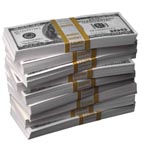Unintended effect of Zimbabwe dollarization - no change!
 Harare - At each till in a large supermarket in the upmarket Avondale suburb of Zimbabwe's capital Harare is a small, much-handled cardboard tray containing boiled sweets, boxes of matches and a few loose eggs.
Harare - At each till in a large supermarket in the upmarket Avondale suburb of Zimbabwe's capital Harare is a small, much-handled cardboard tray containing boiled sweets, boxes of matches and a few loose eggs.
Most customers in the queue are paying in US dollars. If the change for the purchases is less than one dollar, you can take a sweet, a matchbox or an egg, or a combination of them, in lieu of change in cents. Each egg is worth 50 cents, the matches 20 and a sweet 10 - approximately.
"Or do you want a plastic bag?" the till operator asked helpfully.
Zimbabwe's currency, the Zimbabwe dollar, is on the verge of disappearing entirely because of its near total worthlessness, financial analysts say.
Five years of aggressive printing of money to pay for expenditure by President Robert Mugabe's government have reduced the Zimbabwe dollar to a fraction of its worth. On Wednesday, a Zim dollar, as it is usually called, was worth one ten-trillionth of a US dollar or 0.0000000000001 US.
"All our prices are in trillions," says a sign in the Avondale supermarket. Last week, the Reserve Bank of Zimbabwe issued a new 100-trillion-dollar note.
Late last year, Reserve Bank governor Gideon Gono, whose fiscal policy is held responsible for what experts estimate is the highest inflation rate in modern history
(around 18 zeroes) authorized a limited number of traders to charge for goods in hard currency, in the first official acknowledgement of the economy's dollarization.
In reality, a few state-owned utilities are the only organizations still forced to charge in the local currency. Bananas are sold on the street for US or South African banknotes. The rattletrap commuter minibuses that move most of Harare's poor people have been charging exclusively in foreign exchange since Christmas.
"We have to buy all our fuel in US," said Clever Kachangwe, a minibus driver. "We allow them to pay in Zim dollar, but they have to pay double, because when we go to change it into US dollar tomorrow, it will be worthless."
A headmaster from a government high school showed his January pay cheque. It has taken four lines to write out the value in words. "It was worth 8 US dollars," he said.
The state-controlled Herald newspaper, which has maintained an indignant line against the takeover of "imperialist" Western money, announced that it can now be be sold for local and foreign currency.
A copy of the 8-page propaganda sheet costs 1 US dollar, 10 South African rands or 5 trillion Zimbabwean dollars. A vendor quickly whipped out a 10 rand note in change for the 20 rand offered.
It is seldom so easy. Low denomination foreign exchange notes are in short supply and coins are almost non-existent. The queues in supermarkets grow longer, slower and angrier as customers present US 100-dollar bills, arguing with worn-out cashiers whose tills are almost empty.
"Zimbabwe's money now comes from other countries so the supply of banknotes is unreliable," said accountant Davison Masuku. "You can't go to the bank in the morning and draw your small change requirements."
Banking has been transformed. In the third quarter of last year, electronic transfers in Zimbabwe dollars were halted, followed soon after by cheques. Zimbabwe dollars are now also unwanted. Banks report heavy demand for foreign currency accounts, but many are wary after the Reserve Bank plundered unknown millions of US dollars from company and charities' accounts to pay for elections in March and June last year.
Zimbabwe National Chamber of Commerce president Obert Sibanda on Monday appealed for the full-scale unfettered dollarization of the economy to revitalize the economy. "We have to accept the economy has dollarized and all companies should be registered to trade in forex," he said.
But Gono, whose recently-released biography, Zimbabwe's Casino Economy: Extraordinary Measures for Extraordinary Challenges, is on sale in US dollars, is obdurate.
"The Zimbabwe dollar will not be overtaken by any other currency, formally or otherwise, now or at any point in the future," he said last week. (dpa)